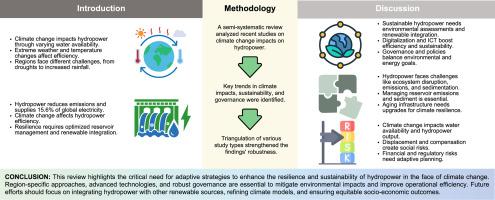可持续水电开发和运行复原力面临的气候挑战:综述
IF 16.3
1区 工程技术
Q1 ENERGY & FUELS
引用次数: 0
摘要
水电仍然是一种重要的可再生能源,在全球发电和减少温室气体排放方面发挥着重要作用。然而,气候变化给水电的可持续发展和运行恢复能力带来了巨大挑战。本综述详细分析了气候变化对水电系统的全球影响,重点关注降水模式变化、温度波动和极端天气事件等关键机制。综述揭示了不同地区受到的影响,一些地区的可用水量增加,而另一些地区的可用水量则大幅减少。报告强调,有必要制定针对具体地区的适应性战略、先进的预测方法和技术进步,以增强水电的抗灾能力。此外,报告还强调了强有力的治理结构、包容性政策框架以及将水电与其他可再生能源结合起来以建立一个多样化和具有复原力的能源组合的重要性。尽管取得了进展,但仍然存在很大差距,特别是在将社会经济因素和土地利用变化纳入水电规划方面。未来的研究应着眼于完善气候模型、提高基础设施的适应能力以及探索与其他可再生能源的协同作用。解决这些问题将使水电能够继续为全球可再生能源战略做出重大贡献,确保在不断变化的气候条件下进行可持续和可靠的能源生产。本文章由计算机程序翻译,如有差异,请以英文原文为准。

Climate challenges for sustainable hydropower development and operational resilience: A review
Hydropower remains a crucial renewable energy source, playing a significant role in global electricity generation and the reduction of greenhouse gas emissions. However, climate change introduces substantial challenges to its sustainable development and operational resilience. This review offers a detailed analysis of the global impacts of climate change on hydropower systems, focusing on key mechanisms such as changes in precipitation patterns, temperature fluctuations, and extreme weather events. The review reveals varied regional impacts, with some regions experiencing increased water availability while others face significant reductions. It highlights the necessity for region-specific adaptive strategies, advanced forecasting methods, and technological advancements to bolster hydropower resilience. Furthermore, it stresses the importance of strong governance structures, inclusive policy frameworks, and the integration of hydropower with other renewable energy sources to establish a diverse and resilient energy portfolio. Despite progress, significant gaps remain, especially in incorporating socio-economic factors and land use changes into hydropower planning. Future research should aim to refine climate models, enhance infrastructure resilience, and explore synergies with other renewable energy sources. Addressing these issues will enable hydropower to continue contributing significantly to global renewable energy strategies, ensuring sustainable and reliable energy production amid a changing climate.
求助全文
通过发布文献求助,成功后即可免费获取论文全文。
去求助
来源期刊

Renewable and Sustainable Energy Reviews
工程技术-能源与燃料
CiteScore
31.20
自引率
5.70%
发文量
1055
审稿时长
62 days
期刊介绍:
The mission of Renewable and Sustainable Energy Reviews is to disseminate the most compelling and pertinent critical insights in renewable and sustainable energy, fostering collaboration among the research community, private sector, and policy and decision makers. The journal aims to exchange challenges, solutions, innovative concepts, and technologies, contributing to sustainable development, the transition to a low-carbon future, and the attainment of emissions targets outlined by the United Nations Framework Convention on Climate Change.
Renewable and Sustainable Energy Reviews publishes a diverse range of content, including review papers, original research, case studies, and analyses of new technologies, all featuring a substantial review component such as critique, comparison, or analysis. Introducing a distinctive paper type, Expert Insights, the journal presents commissioned mini-reviews authored by field leaders, addressing topics of significant interest. Case studies undergo consideration only if they showcase the work's applicability to other regions or contribute valuable insights to the broader field of renewable and sustainable energy. Notably, a bibliographic or literature review lacking critical analysis is deemed unsuitable for publication.
 求助内容:
求助内容: 应助结果提醒方式:
应助结果提醒方式:


